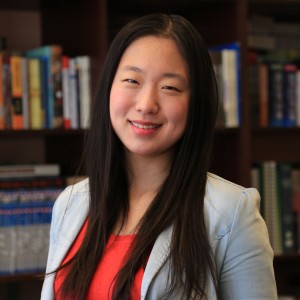A University President's China Vision and Passion: Interview with Prof. Sibrand Poppema
Prof. Dr. Sibrand Poppema, a Dutch Canadian university professor and academic administrator, the president of the University of Groningen (UG) in the Netherlands from September 1, 2008 to September 30, 2018. During his tenure, the university rose from 112 to 59 in the Academic Ranking of World Universities (ARWU) (Wikipedia, 2018). Mr. Poppema is one of the 15 Council Members of the Confucius Institute Headquarters, and also a board member of Groningen Confucius Institute (GCI).
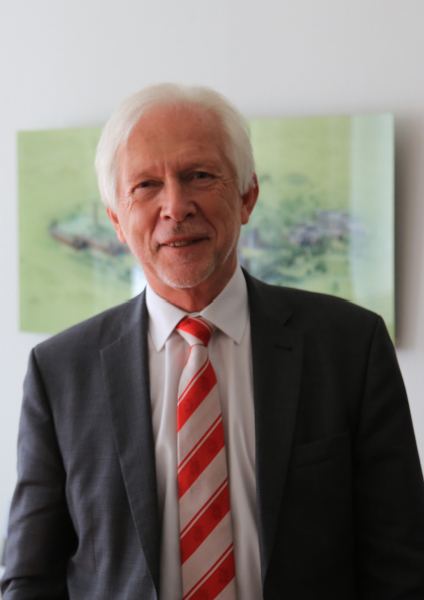
- Prof. Dr. Sibrand Poppema ©GCI
‘What were you disappointed about?’ When the presenter asked Poppema in the video which was displayed in Poppema's farewell on September 27, 2018, he said, ‘Only Yantai (烟台), really…I think more than anything, it’s very regrettable for the UG.’ As many other things, Yantai project (opening the branch Yantai Campus in China), which Poppema had committed to achieve, has become one of the bonds between Poppema and China.
During the last ten years, Poppema has visited China many times, striving to promote cultural and academic exchanges between the East and the West. In the frequent interactions, he has produced many unique insights into China. In this regard, GCI interviewed Mr. Poppema about his visions to China and tried to know more about his passionate mind.

- Prof. Poppema was delivering his farewell speech ©GCI
GCI: We understand that UG has been in cooperation with various Chinese universities. As President of UG and Professor of Pathology, Why do you think China is an important partner?
S. POPPEMA: In the past ten years, the growth [of scientific research in China] has been spectacular. In the Shanghai Ranking, which is mostly about scientific excellence, Tsinghua University reached the 50th position last year and Peking University around 70th. I am sure next year more high rankings will be coming in.
What is more telling is the Nature Index, which ranks by institution and country the best scientific journals in the world publishing the highest quality research in the fields of natural science: physics, chemistry, life sciences, and earth sciences. Among the top 100, 16 are Chinese universities. In chemistry, the No.1 and No.2 are both Chinese universities, just to indicate how strong China has become in that field.
In the near future, China will be spending more money on research than the U.S., particularly when the Trump administration proceeds to reduce research funding as announced. So China will increasingly become a major contributor to global research.
International cooperation and collaboration has always been a strong tradition of the Netherlands. Our country has indeed much collaborated with other European countries, as well as with the U.S. In the years to come, there will be increasing collaboration between Europe and China. It is not about competing with the U.S., it is about how we can jointly move research forward globally. That is what scientists are really interested in: answering research questions while collaborating in finding the answers.
GCI: As President of UG, you have frequently travelled to China since the University of Groningen has developed a multi-faceted cooperation with China over the years. What has impressed you the most during these trips?
S.POPPEMA: Since 2003, I have been visiting China regularly, around two to three times per year. In 2015, when we started the Yantai campus project, I must have gone eight times to China in eight months. More recently, I have travelled to China four to five times per year.
On my first visit in 2003, China was already a very modern and dynamic country. The most remarkable thing about China is that every time you come back, so much will have changed. I remember my first visit to Tianjin in the years before the 2008 Olympic Games. They were building a new hospital there. I soon returned to that city and the main central building of the new hospital was ready; on the next trip I saw that the right wing was completed and shortly after the left wing. The sheer size, number and the speed with which things happen in China is what impresses me and many Dutch people visiting China.
GCI: In your previous position as Professor, you had already met many Chinese students. With increasingly more cooperation between UG and China, you have had more contacts with Chinese scholars and even senior governmental officials. In these encounters, what is it about Chinese people that you consider most striking?
S. POPPEMA: As you said, I mostly was in contact with Chinese PhD students during my time as a professor. I have always found that they were very hard-working and keen on being successful.
At the same time, I thought that many of them were not asking enough questions, said "yes" too often, even when they did not mean "yes". So I always made a big effort to make clear that when you don't agree, you should say that you don't agree. When things don't work the way you had expected, it does not automatically mean that you have to start [the research] all over again. Data are data.
That is one of the first things I have always explained to students: sometimes it is better to sit down and reflect on the method and findings before repeating the research experiment. Hard work alone is not always sufficient.
During my numerous visits to China, I have always been struck by how extremely capable Chinese people in academic and governmental positions are. Clearly, we meet some of the smartest people in China during our visits there. I know that these people are carefully selected. When you meet a Chinese minister and they give a speech, they can in 10 minutes bring up all past and current data and present all future goals in a very coherent way. That is not always the case in the Netherlands. So I am always impressed by the highly qualified chosen minister, as well as the very competent appointed officials in ministries and universities. In a way, selecting the best is not that difficult because there are so many bright and talented Chinese to choose from! Still, that is what impresses me the most.
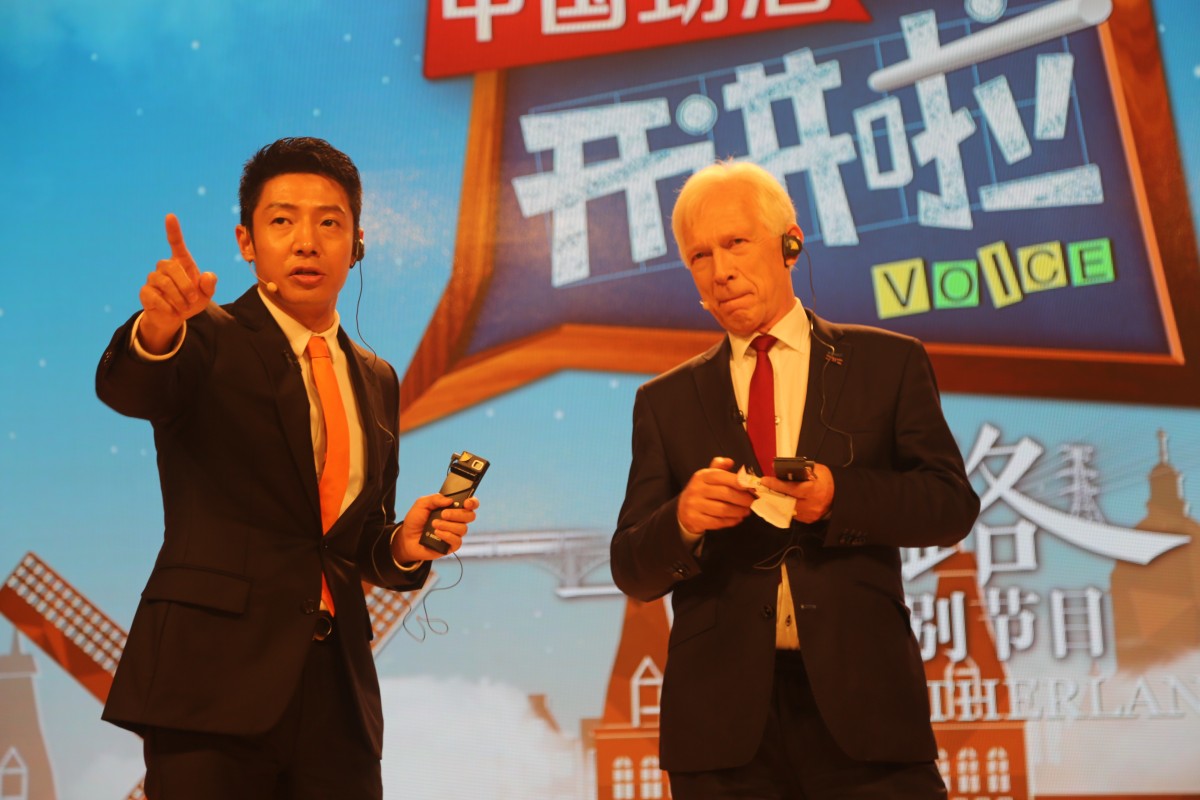
- Prof. Poppema in the renowned Chinese TV program ‘Voice’ hosted by Sa Beining ©GCI
GCI: We know that apart from science and higher education, you are also very engaged in introducing the Chinese language and culture to Dutch people. For example, you are one of the 15 Council Members of the Confucius Institute Headquarters. In your opinion, why is it essential to have Confucius Institutes around the world? As a Council Member, what are your responsibilities?
S. POPPEMA: To understand a country and its culture, it is crucial to know something about its language. That is the major effort of the Confucius Institute: to enable as many people as possible to learn the Chinese language, and thereby also offer them the opportunity to learn more about Chinese culture.
I believe that it is very important for people to travel and visit other countries, but also for them to gain knowledge about those countries. Not just on holiday when one sees so much in so little time, but by going there to work or study, acquiring language skills along the way. Because then you really learn about that country and get a more profound experience and understanding of its culture.
To me, going to another country has always been about observing similar problems yet different solutions, with the emphasis on "different". Not better, not worse, just different. When you see and realise that, you immediately understand that there may be more than one solution to many of our problems. If people learn to understand why other people choose other solutions, maybe in the future we would have fewer disagreements between countries.
The Council advises the Confucius Institute Headquarters on its programmes, namely what activities should be increased and which ones should be reduced.
My personal view is that it would be very wise for Confucius Institutes to allow more discussion, also on subjects where China has a different opinion or position than others. By not participating in such discussions, it can result in a one-sided presentation. It would be much better to have both sides represented at such discussions, so that students and others can reach their own conclusion.
GCI: As President of UG, you are also a board member of Groningen Confucius Institute [GCI], one of the three Confucius Institutes in the Netherlands. In recent years, GCI has dramatically expanded by opening a new branch in Amsterdam, as well as establishing 11 new Confucius Classrooms around the country. Can you share why you support the Groningen Confucius Institute?
S. POPPEMA: For the University of Groningen, it is very important to have a Confucius Institute where students can learn Chinese. Many of our students go to China to study, or in the future, work there. We think it is imperative to give them the opportunity to learn some Chinese and also something about China’s culture. GCI has also been supporting the East Asian Studies programmes at the UG, where students can learn about modern day politics, society and economics of East Asia.
GCI also focuses on supporting people who want to do business with China. Not so much in establishing businesses, but rather in helping people from both China and the Netherlands who are or intend to pursue business opportunities with the other country. That is why we now have a GCI branch in Amsterdam.
GCI also currently supports 11 Confucius Classrooms at the best Dutch high schools throughout the country. These classrooms not only offer Dutch children a chance to learn Chinese, but it is also great for the UG, because these students from the best high schools in the Netherlands will know a bit more about Groningen and may even want to come study at the University of Groningen in the future.
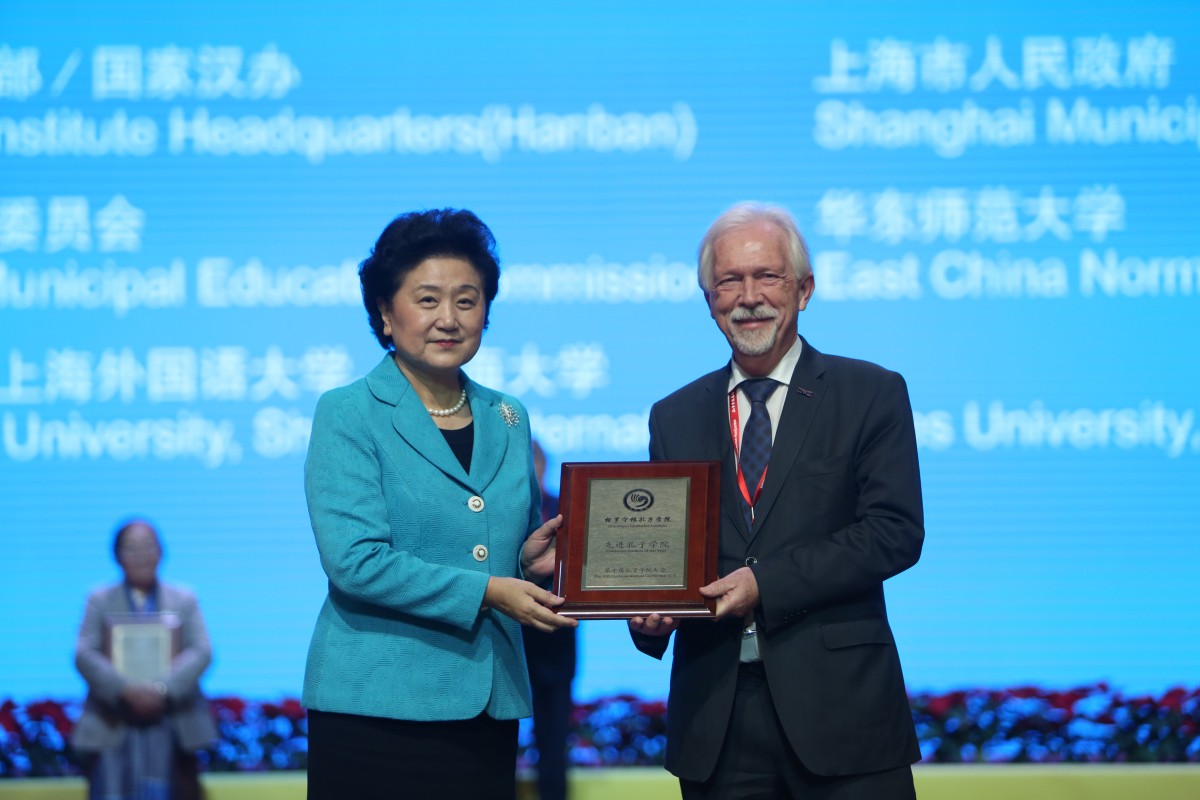
- Prof. Poppema accepting the Award ‘Confucius Institute of the Year 2015’ representing Groningen Confucius Institute from Chinese Vice Premier Liu Yandong at the 10th Global Confucius Institute Conference in Shanghai ©GCI
GCI: UG’s plans for Yantai Campus in China have brought huge attention and heated discussions in the Netherlands. Although the Board of the University has decided not to submit the Yantai proposal, we know that the Yantai project took shape through a long process and UG had made great efforts to facilitate the project. Could you talk about how the initiative was set in motion? What were the hurdles encountered in this project and how were they coped with during the long process?
S. POPPEMA: We were already interested in having a branch campus, since we wanted to become a more international, top global university.
While looking for an opportunity, I heard from a colleague in the UK that the Chinese Agricultural University (CAU) was looking for a partner university for a branch campus in Yantai on an already existing campus, which was a much more attractive proposition than building a campus from scratch, because that takes several years.
In addition, CAU was already a very good partner of UG. Joint programmes between CAU and UG already exist, for instance the Carbohydrate Competence Centre of UG, and others in the energy sector.
There was one very basic problem: the law in the Netherlands does not allow full trans-national education. A Dutch institution can set up three quarters of an educational programme abroad, but must offer at least one year of the programme in the Netherlands. So we needed a change of the law to be able to do it. Fortunately, the Dutch Minister of Education had mentioned plans to change the law in 2014. So we could count on this change to happen.
We also needed to get the approval from both China and people in key positions within the university. We wanted Yantai to become a top research university, not merely focusing on teaching activities. On our visit to China in 2015 we were finally able to sign an agreement.
Within the University of Groningen, people expressed concerns. Some students asked if this meant that faculty and staff would move to China and if so, who would remain in Groningen to teach them. The staff also questioned whether additional personnel would be found in time. In this regard, we made numerous proposals and could reassure the students and staff that proper measures were being taken.
Of course, we also had to deal with all kinds of questions from the Dutch parliament, such as questions about academic freedom. But eventually the Dutch parliament approved to change the law on programme offerings abroad, which was a considerable step for the project.
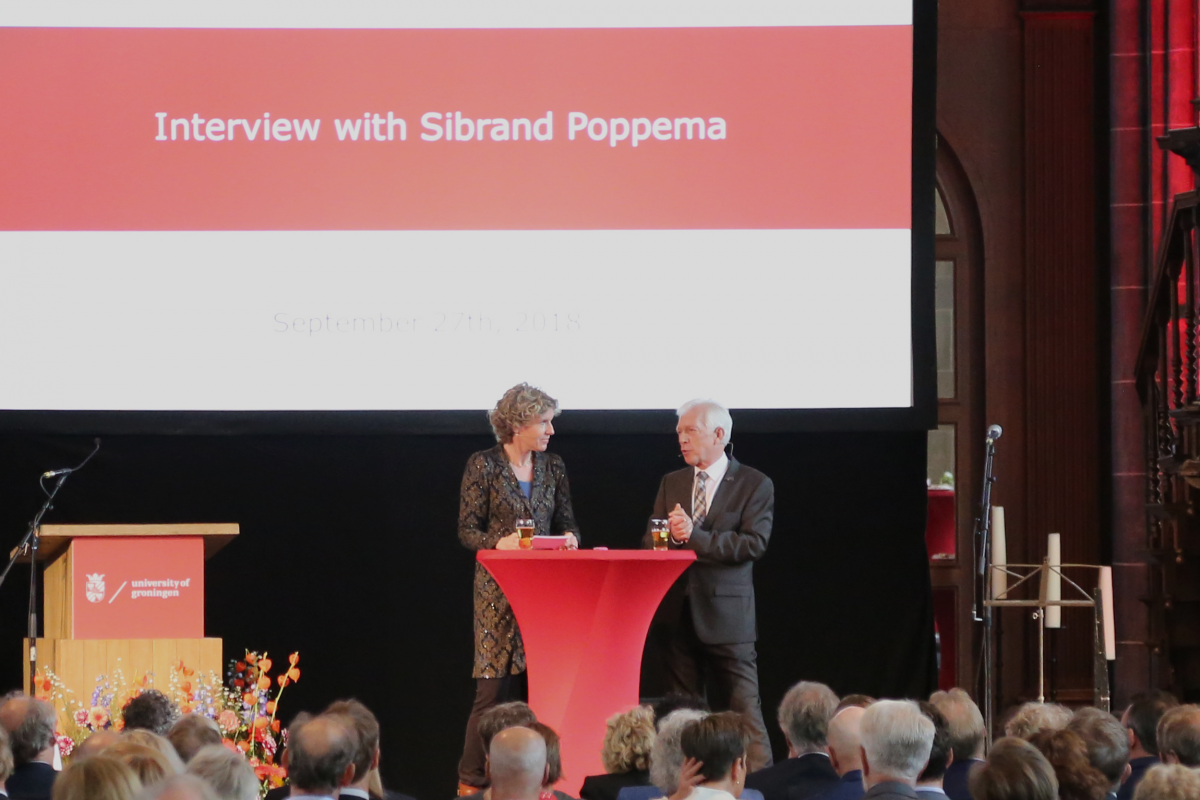
- Prof. Poppema was interviewed in his farewell ©GCI
‘Is Yantai a Waterloo? And if not, why?’ In the farewell of Poppema, Prof. Dr. Janka Stoker from Faculty of Economics and Business – UG as the interviewer asked the question about the Yantai project.
‘No, it’s not Waterloo’, Prof. Poppema answered, ‘If it is, it’s not my Waterloo. It’s the Waterloo of the University of Groningen’. In the video of his farewell Poppema also indicated his belief of China opportunity and felt it really pitiful that Yantai Campus proposal has to be cancelled. ‘I won’t say that opportunity has passed, because it’s still there, but the window is closing. It was regrettable for all the people who did see the opportunity’.
Reference
Wikipedia. (2018). Sibrandes Poppema. Retrieved from
https://en.wikipedia.org/wiki/Sibrandes_Poppema
By Guo Diandian, Co-written by Li Zhihong
Related article:
Sibrand Poppema, The Final Interview published by UKRANT.NL
 Share on Facebook
Share on Facebook Share on Twitter
Share on Twitter Share on LinkedIn
Share on LinkedIn